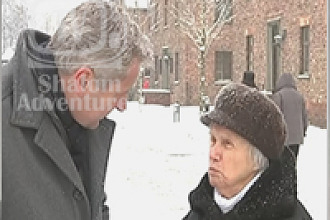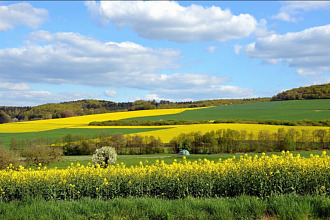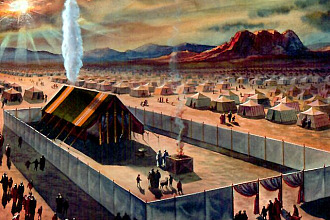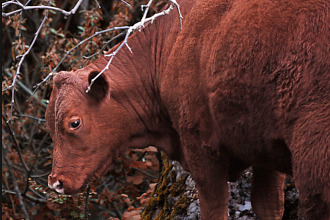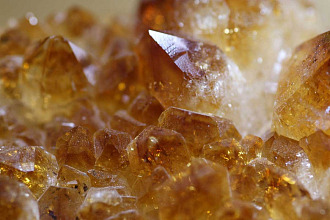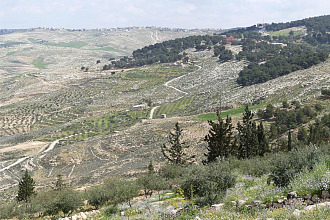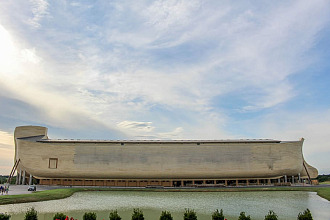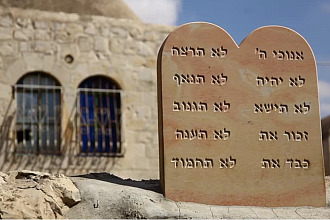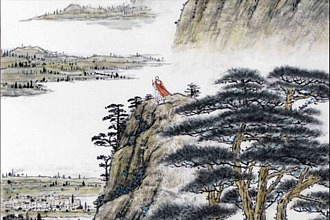Parasha for the Week: Chaya Sara Genesis 23:1 – 25:18.
Haftarah for the Week: 1 Kings 1:1 - 31.
Besorat Yeshua: Mark 11:1 - 14
Overview
Sarah, Mother of the Jewish People, passes on at age 127.
After mourning and eulogizing her, Avraham seeks to bury her in the Cave of Machpela.
Avraham pays its owner, Ephron the Hittite, an exorbitant sum.
Avraham sends his faithful servant Eliezer to find a suitable wife for his son, Yitzchak, making him swear to choose a wife only from among Avrahams family.
Eliezer travels to Aram Naharaim and prays for a sign. Providentially, Rivka appears.
Eliezer asks for water
Not only does she give him water, but she draws water for all 10 of his thirsty camels.
Negotiations with Rivka's father and her brother Lavan result in her leaving with Eliezer.
Yitzchak brings Rivka into his mother Sarah's tent, marries her and loves her.
He is then consoled for the loss of his mother.
Avraham marries Ketura.
Six children are born to them. After giving them gifts, Avraham sends them to the East.
Avraham passes away at the age of 175 and is buried next to Sarah in the Cave of Machpela which is today in the city of Hebron.
"Act of Kindness"
Eliezer, the servant of Avraham, asked Rivka for a drink of water. She gave him and then offered to water his camels. The Torah tells us: "she hastened and emptied her pitcher into the trough and ran again unto the well to draw - and drew for all his camels." (Genesis 24:20)
Rabbi Moshe Chaim Luzzato takes note of the swiftness with which Rivka performed her act of kindness: "She hastened" and "ran again." As the Midrash states, "All of the deeds of the righteous are done quickly" (Bamidbar Rabbah 10:7). Rabbi Luzzatto writes: "The man whose soul yearns to perform the will of his Creator will not be lazy in the performance of His mitzvot. His movements will be as the quick movements of a fire and he will not rest or be still until the deed has been completed" (Mesilas Yesharim, Chapter 6).
"Buying Machpela"
When the time came for Avraham to bury Sarah, he knew the exact location that he wanted (the Cave of Machpela), and its owner: Efron the Hittite. So Avraham goes to the Hittites, and asks to speak to Efron. Efron said a lot and did not even do a little. When first approached, he said to Avraham "No, I don't want you to pay for it! It's a gift, please take it to bury your dead." So in public he declared that he would give Avraham the field for free. Avraham insisted, and Efron then reacted "My lord... what is 400 silver coins between me and you?" So all of a sudden, Efron was hinting for 400 pieces of silver, which is a great deal more than nothing. "And Avraham heard..." -- Avraham understood that Efron wanted this payment. Efron showed us what not to do. We do not want to promise to do great things, and then do nothing at all -- because by demonstrating that our final concern is only our own lust for money or power, we show that we are avoiding spirituality.
"Learning from Sarah's Life"
The Midrash attaches symbolism to the 127 years that Sarah lived. "Let Esther, the de-scendant of Sarah who lived for 127 years, come and rule over 127 provinces."
The explanation is that Esther had a life of trials and tribulations. She was an orphan. She was taken against her will to the palace of the King... Esther could have forsaken her people in exchange for the success and the fame that she was receiving. However, Esther remained rock solid in her faith. She did not let events shape her life. She main¬tained herself. Therefore, Esther could rule over 127 provinces.
HAFTARAH 1 Kings 1:1 - 31
1:1-3 King David is now very old and always cold, it is difficult for him to warm himself. That is why the Haftarah of this week begins with the story of King David being warmed by a beautiful young woman named Avishag. Avishag was employed just to keep him warm and did not became his wife. This young woman is presented as being a Shunammite, that means from the city of Shunem, the very same origin of the widow that Elisha ministered to.
1:4-9 One of King David's sons Adoniyahu proclaims himself king.
1:10 However Solomon, Adoniyahu's younger brother was to become the next king of Israel.
1:11 One of the wives of King David, Queen Bathsheva, mother of Solomon, and the Prophet Nathan, talk together regarding Adoniyahu's will to become king. They decide to report this matter to King David's attention.
1:12-16 Nathan confirms to David the news that Batsheva has told King David about his son Adoniyahu having seized the throne from David.
1:17-21 Bathsheva pleads with David to fulfill his promise of her son Solomon becoming the next king of Israel.
1:22-27 The prophet Nathan confirms again her words.
1:28-31 Kind David promises Bathsheva to rectify the situation. He takes action by instating Solomon as the next King of Israel.
Parasha: Abraham is getting old, he prepare his succession as "Patriarch and Chief of the Hebrew Clan" by getting a wife, Rivka, for his son Itzchak.
Haftarah: David is getting old. He prepare his succession on the throne of Israel and stop Adonijah's plan to become king. To avoid any difficulty he decide to put his son Solomon on the throne of Israel before his death.
Besorat Yeshua Mark 11:1 - 14
Parasha: Send his servance Eliezer for a mission: to find a wife for his son.
Besorah: In this portion of the Besorah Yeshua sends his disciples to find the donkey which will be used for his entry to Jerusalem. "Go into the village ahead of you, and immediately as you enter it, you will find tied there a colt that has never been ridden; untie it and bring it." (Mark 11:1). A very important prophecy about the Mashiach, is going to be fulfilled, the prophet Zecharia said:
"Rejoice greatly, O daughter Zion!
Shout aloud, O daughter Jerusalem!
Lo, your king comes to you;
triumphant and victorious is he,
humble and riding on a donkey,
on a colt, the foal of a donkey." (Zech. 9:9).
In the gospel it is written that Yeshua enter Jerusalem riding on a donkey.
"Then they brought the colt to Y'shua and threw their cloaks on it; and he sat on it. Many people spread their cloaks on the road, and others spread leafy branches that they had cut in the fields. Then those who went ahead and those who followed were shouting,
"Hosanna! Blessed is the one who comes
in the name of the Lord!
Blessed is the coming kingdom
of our ancestor David!
Hosanna in the highest heaven!" (Mark 11:7-10)
Parasha: Which is called "Chaye Sarah" the life of Sarah tells us the death of Sarah. "Sarah lived one hundred twenty-seven years; this was the length of Sarah's life. And Sarah died at Kiriath-arba (that is, Hebron) in the land of Canaan "(Gen. 23:1-2).
Besorah: Yeshua came back to Jerusalem the next day of his triumphal entry in Jerusalem and was sad to see how Jerusalem of that time was spiritually dead.





